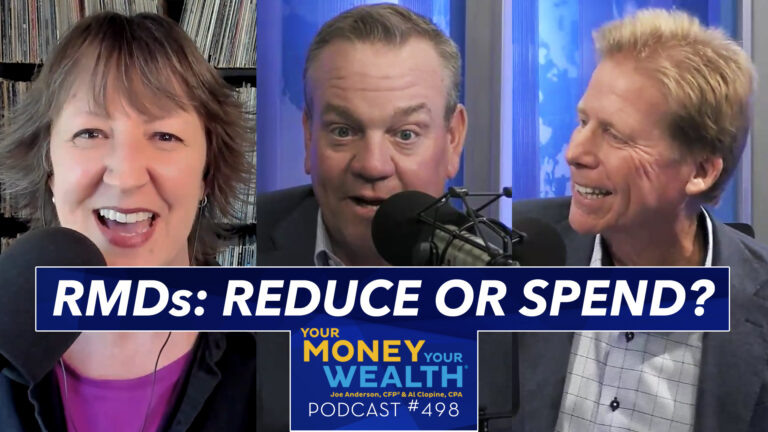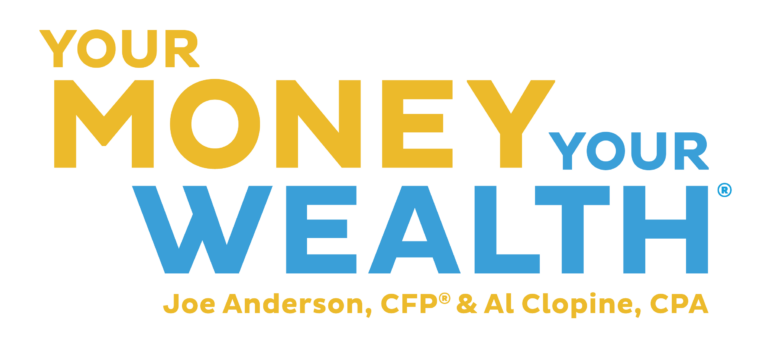Will a financial advisor give you an unbiased opinion? What’s the difference between a TSP and a Roth IRA? Joe Anderson, CFP® and Alan Clopine, CPA answer these questions and more in YMYW podcast episode 91. Original publish date December 17, 2016 (hour 2). Note that content may be outdated as rules and regulations have changed.
00:54 “A stretch IRA is a way for your children, when they inherit your IRA, to stretch it over their lifetime…this may go away…if it goes away, we will go back to old rules which means all money in the IRAs needs to be withdrawn within five years, which could put your kids and grandkids in much higher tax brackets.”
05:17 “A Roth IRA will grow 100% tax-free. There is no required minimum distribution in a Roth IRA. If you pass with a Roth IRA, then your kids can take those dollars out tax-free. So, it grows tax-free you’re your life, your spouse’s life and the kids’ lives. It’s very powerful if you do this right.”
06:54 “This is one of the most important times ever to be doing conversions; the unfortunate thing is you have to do it before December 31st for this year.”
13:52 “If you’re broke, you can always pull out your Roth contribution regardless of what age you are – no tax, no penalty.”
15:08 – “I’m in a 30 year fixed mortgage with Wells Fargo. There have been several financial criminal incidents regarding Wells Fargo this past year. Could my mortgage be negatively affected by this as well as the interest rate hike?”
23:03 – “I recently changed my job. My new employer offers a 401(k) plan, but only after I have worked a certain number of hours. So technically, I cannot contribute towards any retirement account. So as to reduce the tax, can I contribute towards my spouse’s 401(k), and max out his contributions?
We file taxes jointly.”
25:09 – “Will a financial advisor provide an unbiased assessment of a financial plan I already have in place? I already have an Investment Advisor connected with an insurance company who handles our investments. I would like to have an independent financial advisor who can provide an unbiased assessment of our financial plan and investments. Is it possible that an advisor would provide this service and what fee might be expected?”
33:33 – “Can I move money from a retirement account to a Roth IRA and what is the process like? Tax ramifications? Do I have to move all of it?
34:36 – “I am a government employee and have a TSP. What is the difference between that and a Roth IRA? A civilian Roth IRA and TSP?”
Listen to the YMYW podcast:

Amazon Music
AntennaPod
Anytime Player
Apple Podcasts
Audible
Castbox
Castro
Curiocaster
Fountain
Goodpods
iHeartRadio
iVoox
Luminary
Overcast
Player FM
Pocket Casts
Podbean
Podcast Addict
Podcast Index
Podcast Guru
Podcast Republic
Podchaser
Podfriend
PodHero

Podknife
podStation
Podverse
Podvine
Radio Public
Rephonic
Sonnet
Spotify
Subscribe on Android
Subscribe by Email
RSS feed
IMPORTANT DISCLOSURES:
Pure Financial Advisors is a registered investment advisor. This show does not intend to provide personalized investment advice through this broadcast and does not represent that the securities or services discussed are suitable for any investor. Investors are advised not to rely on any information contained in the broadcast in the process of making a full and informed investment decision.
• Investment Advisory and Financial Planning Services are offered through Pure Financial Advisors, LLC, a Registered Investment Advisor.
• Pure Financial Advisors LLC does not offer tax or legal advice. Consult with your tax advisor or attorney regarding specific situations.
• Opinions expressed are not intended as investment advice or to predict future performance.
• Past performance does not guarantee future results.
• Investing involves risk including the potential loss of principal. No investment strategy can guarantee a profit or protect against loss in periods of declining values.
• All information is believed to be from reliable sources; however, we make no representation as to its completeness or accuracy. As rules and regulations change, content may become outdated.
• Intended for educational purposes only and are not intended as individualized advice or a guarantee that you will achieve a desired result. Before implementing any strategies discussed you should consult your tax and financial advisors.
CFP® – The CERTIFIED FINANCIAL PLANNER™ certification is by the Certified Financial Planner Board of Standards, Inc. To attain the right to use the CFP® designation, an individual must satisfactorily fulfill education, experience and ethics requirements as well as pass a comprehensive exam. Thirty hours of continuing education is required every two years to maintain the designation.
AIF® – Accredited Investment Fiduciary designation is administered by the Center for Fiduciary Studies fi360. To receive the AIF Designation, an individual must meet prerequisite criteria, complete a training program, and pass a comprehensive examination. Six hours of continuing education is required annually to maintain the designation.
CPA – Certified Public Accountant is a license set by the American Institute of Certified Public Accountants and administered by the National Association of State Boards of Accountancy. Eligibility to sit for the Uniform CPA Exam is determined by individual State Boards of Accountancy. Typically, the requirement is a U.S. bachelor’s degree which includes a minimum number of qualifying credit hours in accounting and business administration with an additional one-year study. All CPA candidates must pass the Uniform CPA Examination to qualify for a CPA certificate and license (i.e., permit to practice) to practice public accounting. CPAs are required to take continuing education courses to renew their license, and most states require CPAs to complete an ethics course during every renewal period.










